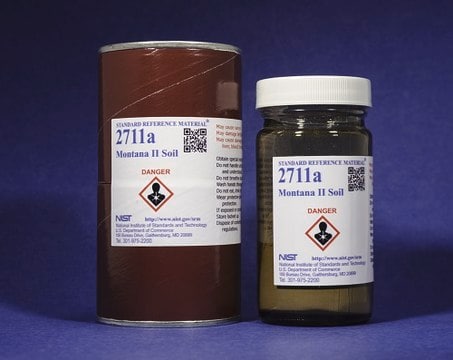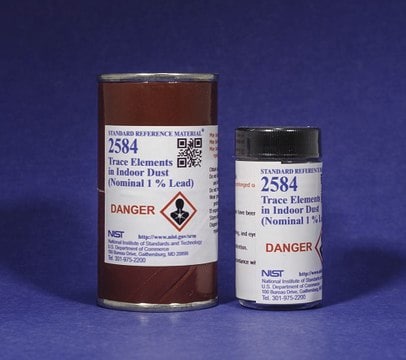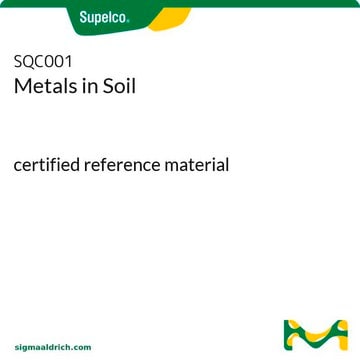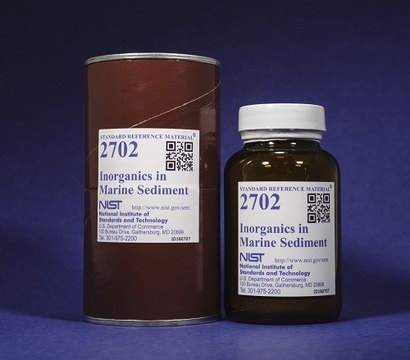NIST2586
Trace elements in soil containing lead from paint
NIST® SRM® 2586, nominal 500 mg/kg lead
Synonyme(s) :
Soil Trace Elements with Lead from Paint
About This Item
Produits recommandés
Qualité
certified reference material
Niveau de qualité
Conditionnement
pkg of 55 g
Fabricant/nom de marque
NIST®
Application(s)
environmental
Format
matrix material
Vous recherchez des produits similaires ? Visite Guide de comparaison des produits
Catégories apparentées
Description générale
Application
- Sources, Pathways, and Concentrations of Potentially Toxic Trace Metals in Home Environments: This study provides a detailed examination of trace elements, including lead from paint, in residential settings. It highlights the significant health risks associated with long-term exposure to trace metals in soils around homes, essential for regulatory actions and public health advisories (Ibañez-Del Rivero et al., 2023).
- Potential Health Risks of Lead Exposure: Focusing on the lifelong risks associated with lead exposure, particularly from contaminated soils, this research underscores the necessity for enhanced public health education to mitigate exposure risks from environments affected by lead-based paints (Olufemi et al., 2022).
- Lead Poisoning of Backyard Chickens: Implications for Urban Gardening and Food Production: Investigates how lead contamination in soil, often sourced from paint, affects backyard chickens, presenting a risk to urban agriculture. The study highlights the importance of assessing and managing soil quality to ensure the safety of homegrown food products (Yazdanparast et al., 2022).
- Lead in the Marine Environment: Concentrations and Effects on Invertebrates: Though focusing on marine settings, this review draws parallels with terrestrial ecosystems by discussing the toxicological impacts of lead on biological systems, relevant for understanding the broader ecological consequences of lead contamination from sources like paint (Botté et al., 2022).
- International Analysis of Sources and Human Health Risk Associated with Trace Metal Contaminants in Residential Indoor Dust: Offers a global perspective on the sources of trace metals in indoor environments, including lead from paint. This extensive analysis aids in developing strategies for reducing health risks associated with trace element exposure in residential and occupational settings (Isley et al., 2022).
Autres remarques
Arsenic (As), Cadmium (Cd), Chromium (Cr), Lead (Pb)
Reference/Informational value is provided for the following analytes.
Aluminum (Al), Neodymium (Nd), Barium (Ba), Phosphorus (P), Calcium (Ca), Potassium (K), Cerium (Ce), Praseodymium (Pr), Dysprosium (Dy), Samarium (Sm), Europium (Eu), Silicon (Si), Gadolinium (Gd), Sodium (Na), Iron (Fe), Strontium (Sr), Lanthanum (La), Terbium (Tb), Magnesium (Mg), Titanium (Ti), Manganese (Mn), Ytterbium (Yb), Mercury (Hg), Yttrium (Y), Zinc (Zn), Perfluorooctane Sulfonate (PFOS), Beryllium (Be), Nickel (Ni), Cobalt (Co), Niobium (Nb), Copper (Cu), Scandium (Sc), Erbium (Er), Selenium (Se), Gallium (Ga), Thorium (Th), Holmium (Ho), Thulium (Tm), Lithium (Li), Vanadium (V)
See certificate for values and more details at nist.gov/SRM.
Informations légales
Produit(s) apparenté(s)
Code de la classe de stockage
13 - Non Combustible Solids
Classe de danger pour l'eau (WGK)
WGK 3
Point d'éclair (°F)
Not applicable
Point d'éclair (°C)
Not applicable
Faites votre choix parmi les versions les plus récentes :
Certificats d'analyse (COA)
Désolés, nous n'avons pas de COA pour ce produit disponible en ligne pour le moment.
Si vous avez besoin d'assistance, veuillez contacter Service Clients
Déjà en possession de ce produit ?
Retrouvez la documentation relative aux produits que vous avez récemment achetés dans la Bibliothèque de documents.
Notre équipe de scientifiques dispose d'une expérience dans tous les secteurs de la recherche, notamment en sciences de la vie, science des matériaux, synthèse chimique, chromatographie, analyse et dans de nombreux autres domaines..
Contacter notre Service technique








